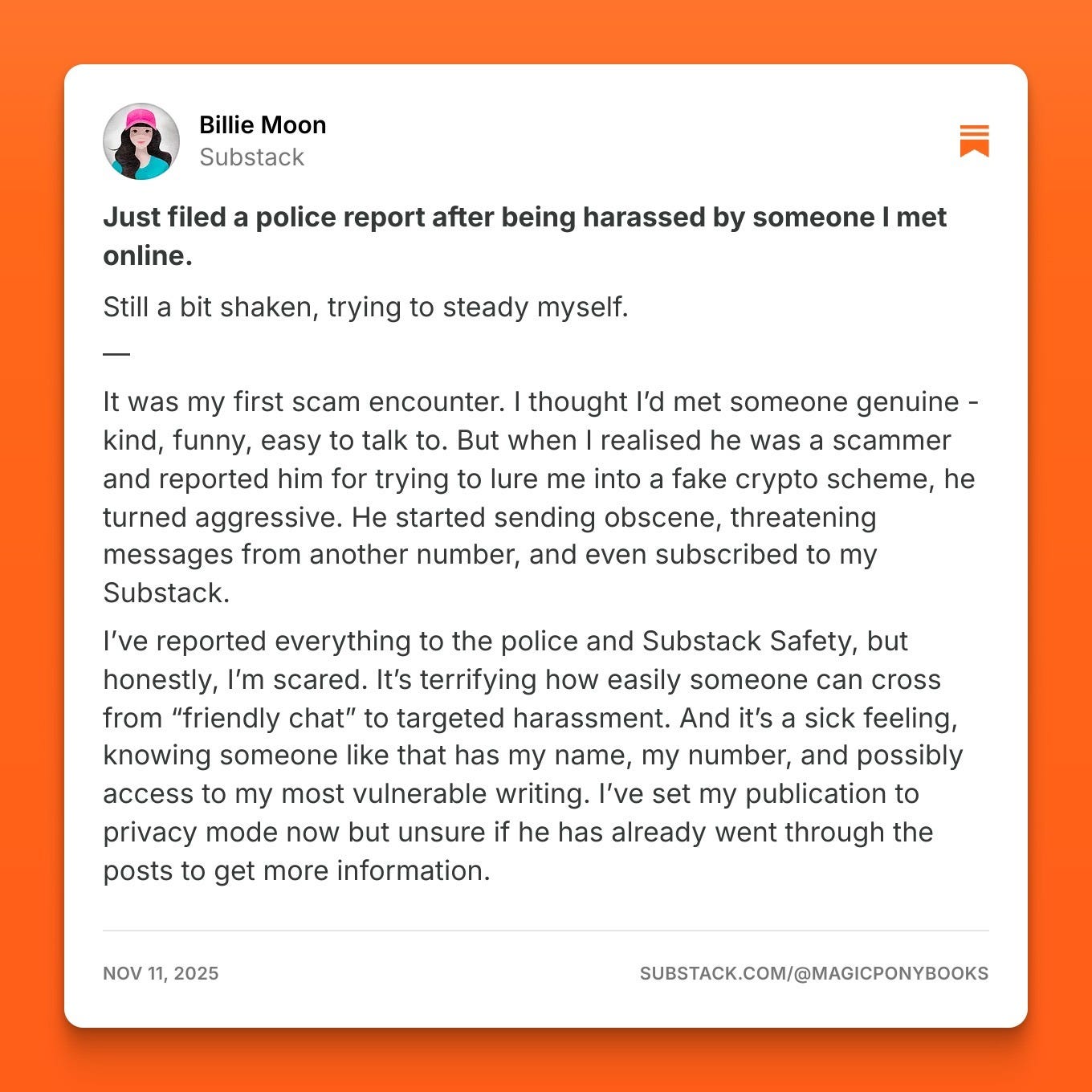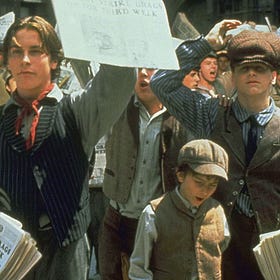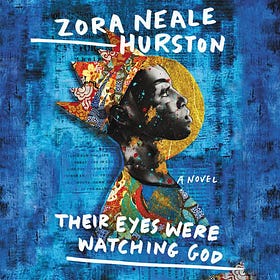When Storytelling is Dangerous
How to be real in your writing without turning your soul into a commodity
Shifting Sands of the Market
There is a phenomenon taking place in the creative market right now. We are seeing trends change before our eyes, and are having to figure out how to adapt to fighting on an entirely new battlefront.
When I was first building my creative career as a writer 10 years ago, I believed I had to fit a certain image if I wanted to be successful. Carefully curated Instagram pages; untouchable professionals; perfectly polished images…they made up the popular standard I stuck to. I was told that if I wanted to be a “credible expert,” a “professional writer,” I had to maintain this polished image. I couldn’t let any flaw of my humanity peek through to the public. Couldn’t let them see me make any mistake. Couldn’t speak too raw or unedited for anyone’s comfort.
In short, I bought the lie that my authentic voice wasn’t good enough. I had to become somebody else.
But then I saw the irony in this strategy: I started realizing that the stories I really loved—the books, poems, songs, and films that really connected with me—were written by imperfect artists about imperfect humanity. Their words and images were raw. Powerful. Heartbreaking. Joyous. Ugly. Imperfect.
They were real.
These stories felt like they went beyond the surface level of entertainment and gave language to the parts of me I was convinced I could never show. The parts that were too messy, too broken, too dark, and too confusing for me to admit existed. The parts of my humanity I was scared to ever show because they made me uncomfortable. They made me hate myself. So why would I expect anyone else to accept that version of me?
The stories that really mattered saw the parts of me the rest of the world had convinced me were unacceptable, and made space for them. The words I sought out, the artists who had my heart and my support, were the ones connected to this part of my humanity.
Not the perfect, polished, professional version of humanity I believed I had to present.
The Lie of Professionalism
We are talking this month at One Brilliant Arc about strategy. How can we most effectively tell our stories for others to hear them? How do we build successful business strategies from our stories that still feel genuine?
The first rule to building credibility in a business strategy usually sounds something like:
“Don’t act human.”
Because if the people buying into you know that you are human just like them, they won’t trust you to offer them something they do not have, and therefore they will not pay you.
Yet, for us creatives, our stories come from deep within our soul. We tell our stories because we want to make somebody feel something. We can’t do that without baring parts of our imperfect humanity. Our words are a gateway to a special kind of vulnerability that most professionals would never dream of modeling.
It’s easy to wear a mask that covers up the mess of the real you; trust someone with 20 years of experience and “proven methods” rather than trust your own voice when you can barely stand what it sounds like in your head alone in the dead of night. Conformity feels safe to us as humans. Standing out with our vulnerability never feels comfortable for anyone.
After decades of following this advice in line with our instincts for self-preservation and covering up our humanity with performance polish, we see that being sold nothing but generic perfection is leaving us all soul-sick and unfulfilled. People now can smell performance and fakeness from a mile away, and they feel bitter because they know it is a lie.
Real humanity is messy. A polished story and a polished presence as an author that fits into the box of commercialized success we have been handed sells great for a bit, because it is a shiny ideal we all aspire for.
We bought into the idea of plastic humanity being more desirable than real, messy humanity.
All it took was a deluge of soulless AI slop to war against the Arts before we realized that humanity is starving for something real.
We already know the unmatched power of storytelling to transcend time, culture and language; to touch people and heal hearts; to resonate more effectively and instantly than any other form of communication; to forge instant connection and trust with our readers. The statistics prove that our authenticity—our honest vulnerability—supercharges the power of storytelling. When you combine the powers of storytelling and authenticity, you have a winning creative business strategy.
While storytelling+authenticity is a winning business strategy, it also carries consequences, dangers, and pitfalls that are downright terrifying.
Am I Traumatized Enough To Be a Good Writer?
Over my (relatively) short creative career, I saw the marketing trend for writers flip from ‘Performance Polish’ selling best to ‘Raw, Dark, Gritty Trauma’ selling best. We started realizing the consequences of never being real and started putting more value on honest human connection. So these days, it seems that the more raw, vulnerable, and ugly you write, the more you are rewarded with views, likes, popularity, and client conversion. This shift is great for writers who have been desperate to take off the mask of performance polish and write the emotional truths that really matter!
However, the pitfall of this kind of vulnerability being rewarded is that we’re starting to see a toxic contest take place. In order to “beat” the other stories out there, you have to top their trauma. Now, our vulnerability is being sold as shock value and sensationalized. Instead of space being made for our pain and healing being catalyzed, our pain is commercialized and sold to the highest bidder. The real trauma we have experienced is being exploited and sold as entertainment instead of being used to spark connections of education and sensitivity.
Our souls are in danger of becoming a commodity.
Another danger is that horrible people who are okay with treating our very real trauma as their personal entertainment can take advantage of our vulnerability.
The other day, over breakfast, I was casually scrolling Substack looking for more soulful creators to connect with when I saw an update from the lovely Billie Moon—award-winning author, illustrator, and designer who is creating collaborative projects and community here on Substack to help others heal their stories along with her—that struck me to my core.
We talk a lot here at One Brilliant Arc about telling your story without fear, speaking your truth, and owning your voice. Our entire mission is to empower creators to tell their honest stories with their authentic voice—because the stories that heal hearts and change the world are the ones that are raw, vulnerable, and human. But telling these kinds of stories takes serious guts.
Billie’s experience is one example of the price we have to pay for sharing these vulnerable truths about ourselves, isn’t it? Ever since reading her Note, I couldn’t help asking myself over and over:
Is it a fair price to pay?
The Breaks of a Sacred Calling
The answer is no. Obviously this kind of evil and brokenness in our world shouldn’t exist. It’s wrong; sad; disgusting.
And yet it does exist.
We can’t ever fully eliminate the darkness that we are all sick of. It will plague us as long as we are alive. The only way to fight back against that kind of darkness overrunning the world is to create more light. More places for goodness to flourish. More stories that invite personal introspection, growth, and healing. More space for genuine human connection. In order for that to happen, we need more brave storytellers.
The same day I came across Billie’s Note, I also came across this Note by Jason Arehart:
He is so right. Not only do we not talk enough about the logistical hard work that being a writer requires, but we don’t talk about the emotional toll it takes on us. And we really, truly need to recognize this if we want to keep good storytellers safe and supported.
We never lie to the writers we work with at OBA—whether through our personal coaching or editing services, workshops, or collaborations and conversations—that storytelling that can change the world for the better requires unprecedented bravery. Writers who dared put the truth in ink in the past faced censorship, prison, and fire for their words. Evil powers desperately want to silence the storytellers who have something powerful to say.
Opening up ourselves to this world is scary for a good reason: it can truly be dangerous. We need to be wise about how to protect ourselves from the nefarious intentions of others. We have to be careful that in speaking our truth, we don’t allow our souls to become commodities. Yet we also need to be resolved in our purpose. Confident in our power. Unshakable in our individual worth and identity.
Our community of creatives also must learn how to rally around each other and have each other’s backs. I understand that it is easy to feel more threatened than thrilled at someone else’s wins when competition is so high and we are all fighting to put food on the table. The chasm between the financial security of those who “make it” in a creative career and those who don’t is disproportionately wide. This industry has historically been heavily gatekept and it is hard to change those patterns and rebuild trust. But the community of writers and creators on Substack is trying to rewrite this narrative!
Writing is solitary and heavy work. Why would we make the work even more isolating and heavier on ourselves by not sharing the burden with others? Why not allow ourselves to be inspired and carried by the stories of others, lifting up voices who are tired and encouraging everyone doing their best to put more light into the world to not give up?
Does the Winning Strategy Ever Win?
There’s no easy answer for any of this. I’m not writing this post claiming to have one. I’m writing it because these things have been heavy on my mind recently. What I really want to say to those of you who are these incredible storytellers—working your butts off, baring your souls, holding the weight of the human condition, and braving the full blast of darkness that you get from society in return:
I see you. You are amazing. And I want you to know that what you are doing is necessary, honorable, brave, and beautiful.
Billie Moon and Jason Arehart, you are both incredible humans doing wonderful creative work, and I want to thank you both for inspiring my journey.
To anyone who reads this who does not yet have a career in the arts:
Know that this is what this calling actually requires of you.
If anything, I hope my words will help you gain a new appreciation and respect for a work that is crucial for humanity yet too often goes unappreciated and unprotected.
A creative career oftentimes feels less like a career and more like a lifestyle of sacred duty. If success ever comes, it is very rarely in the form of money, fame, or writing two hours a week on serene porches or beachfronts with champagne in hand. Success in this line of work comes in the form of an exhausted and hungry 3am after you have stayed up all night searching your soul for the right words and you finally feel something crack in your chest. It comes in that moment when you are about ready to give up because you just can’t find it in your heart or your bank account to keep going, then you receive a random comment or message from someone that says your words made them cry. It comes in the form of a quiet whisper you leave as your legacy that you may or may not ever see ripple into a mighty roar.
Success only comes after you have emptied yourself of everything.
Want free, safe, trauma-informed feedback from professional editors on a particularly vulnerable story you’re working on? OBA’s story team is here for you! Submit your work in progress for a FREE editing session with our panel of story coaches and let us help you take the next brave step to sharing your story with a world that needs it.
More we’ve talked about at One Brilliant Arc (OBA):
Don't Sell Out
5 films that encourage us to keep raising our voices and speaking the truth even when the odds are wildly against us.
Does Your Voice Actually Matter?
How to write more powerfully by leaning into your unique voice...even if it is unpopular.








Beautifully said. We are who we are the most we share of the truth the better humans we are to ourselves as well. There is enough false narratives outthere. I am not interested in them. Just be you. That is all I am as well.
I find the most compelling stories and characters are the ones with a deadly flaw. They could be great, but this issue causes them to get in their own way.
I notice that the Olympics of suffering happens online too. People arguing over who's trauma is greater.